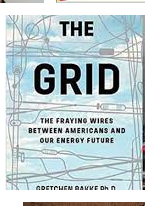It’s a truism that the United States, like the rest of the developed world, is dependent on electricity to power our homes, our transportation systems, and our communications. In “The Grid” Gretchen Bakke, a cultural anthropologist, examines our electric grid, exploring how it developed and the cultural factors that maintain it (or, as she points out, fail to maintain it adequately). News reports focus on energy sources – coal, oil, gas – but rarely on what Bakke calls the “complex and expansive electrical delivery system”: the wires, substations, poles and transformers that bring power from distant sources to our wall outlets. This system, Bakke says, “is the world’s largest machine and the twentieth century’s greatest engineering achievement.” We mostly ignore it, until it breaks down, as it is doing with increasing frequency (measured both by number and the length of power outages). A green and sustainable energy future is achievable, Bakke reminds us, but not without the grid.
Many of the steps we need to take to reach that future are reasonably obvious: reduce demand, increase renewable energy, develop a way to store energy. But Bakke identifies some unexpected ones as well: widen the use of smart meters, don’t build energy sources to meet peak demand but try instead to level demand, improve the grid, and integrate electric vehicles into the mix. But none of these alone will be sufficient, and as each one is integrated, all the others need to be taken into account. Bakke spends most of her interesting, if occasionally feverishly written, exploration of the electric grid sketching the complex financial and infrastructure decisions that have brought us to a point where many competing demands place irreconcilable stresses on the grid.
Here’s one example. Home solar panels feed power into the grid, enough (if the sun is out) to offset that home’s electricity use. But instead of paying the power company (a regulated monopoly) the homeowner pays the installer. From the homeowner’s perspective, solar panels are a good deal: their price will not go up, the way electricity bills do. From a public policy perspective, it’s also a good deal: increased use of solar power means less use of expensive and polluting fossil fuels. But from another policy perspective, it’s missing something: the power company must maintain the poles and wires and transformers – the grid. But the utility receives no money from the solar companies to maintain the grid, even though electricity from those panels feeds into the grid. Less money for maintenance means more infrastructure problems down the road, and higher costs for the utility’s remaining customers.
That’s just one example; every one of the solutions is similarly multi-faceted. Can we solve the problems, or at least come up with new ways of generating and transmitting electricity? Bakke believes yes, with a concerted effort that will require acceptance of new ways of thinking even while we continue to pay to maintain old infrastructure. Electric cars can play a bigger role, for example, as they can be seen, in Bakke’s words, as “great big batteries on wheels.” With enough of them, she writes, car batteries, if engineered to return power to the grid (yes, it’s possible), can act as storage units. Charged, they can be driven; plugged in while parked, the excess can be returned to the grid as power. The car can be recharged overnight. It’s not enough, alone, especially now, but it’s plausible – cars spend most of their time parked.
“The Grid” provides an engaging look at a system we take for granted. Readers interested in the environment, in global warming, or just worried about when the next blackout is coming should add it to their lists.
Have a book you want me to know about? Email me at asbowie@gmail.com. Follow me on Twitter @abowie917




